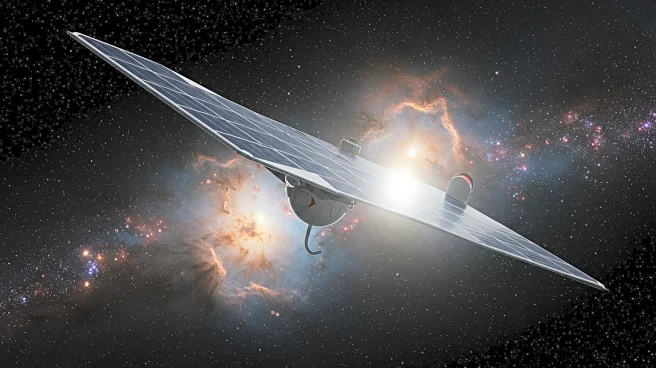What's Happening?
The University of Nottingham has unveiled groundbreaking research into fuel-free spacecraft propulsion systems, offering a promising avenue for sustainable space exploration. The study, titled 'Modeling and Numerical Optimization of Refractive Surface Patterns for Transmissive Solar Sails,' published in Acta Astronautica, introduces a novel approach to spacecraft propulsion that does not rely on traditional fuel-based methods. By utilizing sunlight through microscopic refractive patterns, these solar sails provide superior control and propulsion efficiency. This innovation could significantly reduce the dependence on onboard fuel, allowing spacecraft to operate longer in deep space without the need for refueling. The research team, in collaboration with NottSpace, has developed ultra-light, fuel-free propulsion systems that could revolutionize space missions by enabling longer and more complex journeys.
Why It's Important?
The development of transmissive solar sails represents a significant advancement in space technology, with potential implications for both space exploration and environmental sustainability. By reducing the need for fuel, these sails could lower the cost and increase the feasibility of long-term space missions, expanding humanity's reach into the cosmos. Additionally, the technology holds promise for space debris mitigation, addressing a growing concern for satellite operators and space missions. The ability to remove debris efficiently could enhance space sustainability efforts. Furthermore, the research explores the possibility of using solar sails for planetary sunshade systems, contributing to global solar geoengineering efforts aimed at mitigating climate change. This dual application in space exploration and climate intervention underscores the transformative potential of solar sail technology.
What's Next?
The research team is already integrating transmissive solar sails into CubeSat missions, such as WormSail and JamSail, to demonstrate their practicality and efficiency in real-world space operations. These missions aim to validate the potential of solar sails for future space endeavors. Additionally, the concept of using solar sails for climate interventions is gaining traction, with presentations at United Nations events highlighting their role in future climate resilience strategies. As the technology evolves, further collaborations with institutions like the Technical University of Munich and KTH Royal Institute of Technology, Sweden, are expected to explore more ambitious applications. The ongoing development and testing of solar sail prototypes will continue to inform their design and operational readiness.
Beyond the Headlines
The ethical and environmental implications of solar sail technology are profound. As space exploration becomes more sustainable, the potential for reducing the environmental impact of space missions grows. The integration of solar sails into climate resilience strategies also presents a unique opportunity to address global warming through innovative space-based solutions. This research could pave the way for new approaches to sustainability on Earth, leveraging space technology to combat pressing environmental challenges. The ability to tailor solar sails for specific missions further enhances their versatility, offering a customizable tool for navigating the unpredictable nature of space environments.










